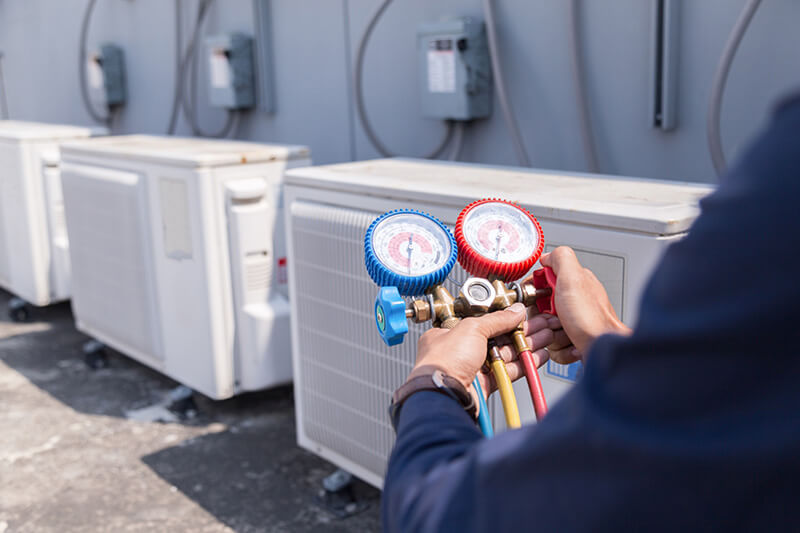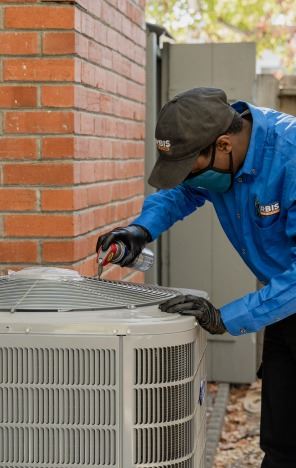What Not to Do During heat pump installation ooltewah tn
What Not to Do During heat pump installation ooltewah tn
Blog Article
Picking Between a Warm Pump and Heater: Secret Considerations for Your A/c Requirements
When reviewing heating options for heating and cooling needs, the choice in between a heatpump and a heating system can be intricate. Each system provides distinctive advantages tailored to specific environments and power efficiency goals. Recognizing these distinctions is vital for making an enlightened option. Key factors such as installment expenses and ecological effect further complicate the selection procedure. Which choice absolutely lines up with one's comfort and sustainability choices? The following areas will certainly explore these factors to consider thoroughly.
Understanding Heat Pumps: Exactly How They Function and Their Benefits
While many property owners take into consideration various heating alternatives, comprehending how warmth pumps feature and their advantages can significantly influence their choice. Heatpump operate by transferring heat as opposed to producing it. In the winter season, they extract heat from the outdoors air or ground and transfer it inside, while in the summer season, they reverse this procedure, cooling down the home by expelling warm outside. This double functionality makes them functional for year-round climate control.One of the primary advantages of heatpump is their energy efficiency. They make use of substantially less electricity compared to conventional heater, potentially resulting in reduced energy expenses (furnace replacement). In addition, heatpump have a smaller carbon impact, making them an eco-friendly option. They likewise call for much less upkeep than standard systems, contributing to long-term cost savings. Overall, comprehending the auto mechanics and advantages of heatpump can assist house owners make notified decisions regarding their heating and cooling needs
Discovering Heaters: Kinds, Procedure, and Benefits
Heaters can be found in numerous kinds, including gas, electric, and oil versions, each with distinctive functional mechanisms. Understanding these distinctions is essential, as they impact performance and home heating efficiency. Additionally, heating systems use various benefits, such as consistent heat result and integrity in cooler climates.
Kinds of Heaters
Furnace can differ considerably in design and procedure, with heating systems being a preferred selection among house owners. There are several sorts of heaters, each using different gas sources and innovations. Gas heating systems are common, leveraging natural gas to create heat efficiently. Electric heating systems, on the various other hand, utilize electric resistance to generate warmth, frequently preferred for their uncomplicated installment. Oil heating systems, while less typical, work in locations with minimal gas access (heat pump service). Furthermore, condensing furnaces maximize energy effectiveness by capturing and reusing exhaust gases. Each kind runs through a system of heat exchangers and ductwork to disperse warm air throughout a home. Recognizing the differences between these heating system kinds is important for educated HVAC decisions
Advantages of Heating systems
For homeowners seeking reliable heat throughout cool months, the advantages of heaters are substantial. Furnaces offer consistent home heating, making certain even temperatures throughout the home. They are especially effective in extreme cool, usually outmatching warmth pumps in frigid problems. Various types, including gas, electrical, and oil heaters, supply flexibility to meet diverse needs and preferences.Furnaces also tend to have lower initial setup costs compared to heatpump, making them a much more available choice for lots of. Their durable design contributes to a longer lifespan, with several units lasting over 15 years with proper upkeep. Additionally, modern heaters are often equipped with advanced modern technology for boosted performance, which can bring about lowered power expenses. Overall, furnaces continue to be a reputable selection for effective home heating.

Power Effectiveness: Contrasting Warm Pumps and Furnaces
When contrasting energy efficiency between heatpump and heating systems, the Seasonal Power Efficiency Ratio (SEER) plays an important duty in determining performance. Furthermore, an operational expense analysis exposes the lasting economic implications of each system. Comprehending these aspects can lead homeowners in making informed decisions regarding their heating options.
Seasonal Power Performance Proportion
Power performance plays a vital duty in the decision-making procedure in between warmth pumps and heaters, particularly when considering the Seasonal Energy Efficiency Ratio (SEER) This metric measures the cooling efficiency of heatpump over a whole air conditioning period, giving a standard method to examine performance. Higher SEER ratings indicate greater power performance, equating to lower power consumption and reduced energy costs. In comparison, heating systems are commonly analyzed making use of the Annual Fuel Application Performance (AFUE) score, which mirrors home heating effectiveness. When contrasting these two systems, homeowners must focus on SEER scores for heatpump, as they directly influence general energy financial savings and ecological sustainability. A thorough understanding of SEER can especially influence the long-term satisfaction and cost-effectiveness of the picked a/c service.
Functional Expense Evaluation
Recognizing the operational prices connected with heatpump and heaters is important for house owners examining their options. Warmth pumps normally provide greater energy performance, converting electrical power into warm with very little waste. This leads to reduced regular monthly energy bills, particularly in moderate climates. Alternatively, conventional heaters, particularly gas versions, may have reduced in advance prices but can sustain greater operational expenditures with time as a result of sustain costs and effectiveness ratings.Moreover, warm pumps can work as both heating and cooling down systems, potentially decreasing the demand for separate a/c devices. While initial investments for warmth pumps may be higher, their long-lasting cost savings in power performance can make them a more economical selection for many homes. Cautious evaluation of neighborhood power prices is necessary to establish the very best option.
Setup Prices: What to Anticipate for each and every Heater
Installment prices for heating unit can vary significantly between heatpump and heating systems, affecting house owners' choices. Heat pumps typically have greater in advance installment expenses, typically varying from $3,500 to $8,000, depending on the system dimension and complexity of installment. This consists of the exterior system, indoor handling system, and needed ductwork modifications. Alternatively, furnaces often tend to have reduced preliminary costs, averaging in between $2,500 and $6,000, which can be appealing for budget-conscious home owners. Installment costs can enhance if extensive ductwork is required.Moreover, the choice of gas kind for furnaces-- all-natural gas, lp, or electric-- can additionally impact installation costs. While heat pumps offer energy performance, their initial investment may discourage some customers. Eventually, evaluating setup expenses alongside lasting cost savings and performance will certainly help homeowners in making educated choices concerning their furnace.
Environment Factors To Consider: Which System Does Better in Your Area
Just how do climate conditions affect the performance of home heating systems? The efficiency of heat pumps and heating systems can differ greatly depending on the neighborhood climate. In moderate environments, warm pumps excel by effectively moving heat from the outdoors air, making them an energy-saving alternative. Nevertheless, check it out their performance diminishes in incredibly cool temperatures, where they might struggle to extract adequate warm. On the other hand, heaters, particularly gas designs, supply reputable and consistent heat no matter outside problems, making them preferable in colder regions.In areas that experience milder winters months, heatpump can run efficiently year-round, supplying both heating & cooling. On the other hand, areas with rough winters commonly take advantage of the effectiveness of heaters. Inevitably, recognizing the neighborhood environment is crucial when deciding in between a warmth pump and a heating system, as it straight impacts their operational efficiency and overall efficiency.
Maintenance Needs: Long-Term Take Care Of Heat Pumps vs. Furnaces
While both warmth pumps and heaters need regular maintenance to assure peak efficiency, their certain requirements and care regimens differ significantly. Heating systems commonly need less constant interest, with annual inspections sufficing to look for gas leaks, clean filters, and assess total functionality. Their easier style commonly enables uncomplicated repairs.In comparison, heatpump necessitate semiannual maintenance due to their twin role in heating and air conditioning. This consists of cleaning coils, inspecting refrigerant degrees, and guaranteeing that both the indoor and outdoor systems function at their finest. Additionally, warmth pump upkeep typically entails more detailed elements, making specialist servicing essential.Neglecting upkeep can result in reduced effectiveness and boosted energy costs for both systems. Ultimately, home owners should think about these lasting care requirements when picking between a heatpump and a heater, as aggressive maintenance can extend the life-span and efficiency of either system considerably.
Ecological Influence: Choosing a Lasting Heating Alternative
The ecological effect of heating systems is a vital analysis for house owners looking for sustainable choices. Heatpump are usually more energy-efficient than conventional furnaces, as they transfer warm instead of create it, greatly reducing carbon discharges. By making use of renewable power resources, such as air-source or geothermal heatpump, homeowners can better minimize their environmental footprint.On the various other hand, all-natural gas heating systems discharge greenhouse gases and add to air contamination, though they typically supply greater warmth output. Nevertheless, improvements in technology have caused the development of high-efficiency heaters that minimize emissions.Ultimately, picking a heating unit entails evaluating efficiency against environmental effect. Home owners are encouraged to mirror on neighborhood energy resources and incentives for eco-friendly systems, ensuring a selection that lines up with both personal convenience and ecological obligation. The decision influences not just prompt comfort but additionally long-term sustainability and ecological health.
Frequently Asked Questions
For How Long Do Warmth Pumps and Furnaces Usually Last?
The life-span of heatpump normally ranges from 15 to 20 years, while heating systems can last in between 15 to three decades. Normal upkeep substantially affects their long life and efficiency in offering heating remedies.
Can I Utilize a Heatpump in Incredibly Cold Climates?
Heatpump can operate additional resources in extremely cold environments, yet their efficiency decreases as temperature levels decrease. In such problems, additional heating resources might be essential to maintain comfortable interior temperature levels and guarantee peak performance.

What Is the Noise Level of Warm Pumps Versus Furnaces?
The noise degrees of heatpump and furnaces differ significantly. Normally, warm pumps operate more quietly than conventional heating systems, making them more suitable for those conscious sound, while heaters may create louder functional sounds throughout heating cycles.
Are Warmth Pumps Suitable for Both Cooling And Heating?
Warmth pumps are undoubtedly ideal for both cooling and heating (heat pump installation ooltewah tn). They work by transferring warmth, offering efficient temperature level control year-round, making them a functional option for property owners looking for an all-in-one heating and cooling remedy
What Size Heating System Do I Required for My Home?
Identifying the proper dimension furnace for a home requires reviewing factors such as square video, insulation high quality, local climate, and the home's layout. Consulting a professional can ensure a precise evaluation and excellent convenience. Warmth pumps commonly offer higher energy efficiency, converting electrical power right into warmth with very little waste. In modest environments, warm pumps stand out by successfully transferring warm from the outside air, making them an energy-saving choice. Conversely, heating systems, especially gas models, provide reputable and consistent heat no matter of exterior conditions, making them more suitable in colder regions.In areas that experience milder winters, heat pumps can run properly year-round, giving both home heating and cooling. Warmth pumps are normally more energy-efficient than typical heaters, as they move warm rather than produce it, significantly decreasing carbon discharges. By using sustainable energy resources, such as geothermal or air-source warm her latest blog pumps, home owners can additionally decrease their environmental footprint.On the various other hand, natural gas heaters give off greenhouse gases and add to air contamination, though they usually provide higher heat outcome.
Report this page